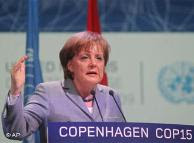 German Chancellor Angela Merkel had hoped for more than the bare-bones minimum at the Copenhagen climate conference, but has warnedagainst 'bad-mouthing' the outcome.
German Chancellor Angela Merkel had hoped for more than the bare-bones minimum at the Copenhagen climate conference, but has warnedagainst 'bad-mouthing' the outcome. In an interview with the German daily Bild am Sonntag Chancellor Merkel defended the meager results, after nearly two weeks of haggling, saying it was at least a "first step" toward a new global strategy on climate change and one that "now needed to be built upon."
She quickly admitted, however, that she would have preferred "more steps," but that one should still refrain from "bad mouthing" the outcome.
Merkel noted Germany's special responsibility in the next phase of diplomatic negotiations to combat global warming. The chancellor stressed that her government would work to move the results forward when the next climate conference convenes in Bonn, Germany, in the middle of next year.
Leaders try to put a positive spin on the outcome
Delegates to the summit, which ended Saturday, admitted that only a bare-minimum agreement was reached that fell far short of the original goals.
Although UN Secretary-General Ban Ki-moon also called the deal a "significant first step",
he regretted that "much was left to be done."
 Putting a brave, but almost cynical, face on the outcome, US President Barack Obama called the results "an important breakthrough". "For the first time in history, the world's major economies came together to accept their responsibility to act in the face of climate change," Obama said.
Putting a brave, but almost cynical, face on the outcome, US President Barack Obama called the results "an important breakthrough". "For the first time in history, the world's major economies came together to accept their responsibility to act in the face of climate change," Obama said.Admitting that the negotiations had been "extremely difficult" and "complex", the US president said the Copenhagen Accord paved the way for international action in the coming years.
Even the Chinese, who many blame for blocking the negotiations, defended the outcome, saying the conference ended with "important and positive" results. Foreign Minister Yang Jiechi said the conference was "not the goal, but rather a new beginning
German opposition and environmentalists outraged
 Germany's opposition Social Democrat leader, Sigmar Gabriel, called the conference outcome a "mid-sized disaster" and said it was "a disgrace how world leaders were playing with the future of their children and grandchildren." He called on Germany and the European Union to "stick to their promise to reduce CO² emissions by 30 percent" by 2020.
Germany's opposition Social Democrat leader, Sigmar Gabriel, called the conference outcome a "mid-sized disaster" and said it was "a disgrace how world leaders were playing with the future of their children and grandchildren." He called on Germany and the European Union to "stick to their promise to reduce CO² emissions by 30 percent" by 2020.Green party chairwoman, Claudia Roth, called the outcome "a betrayal of the future for all the children on this planet" and urged the EU to convene an extraordinary summit to at least establish binding climate goals for its members.
The head of the German Conservation Society, Olaf Tschimpke, said Copenhagen ended with a "rotten compromise." His counterpart at Germany's BUND conservation group, Hubert Weiger, said the world was left "bitterly disappointed" and the anti-globalization network, attac, called the summit "a farce" and "historic for its failure."
The climate conference ended with the promise to continue negotiating, but without a deadline, after 14 years of preliminary negotiations.
in indonesia






